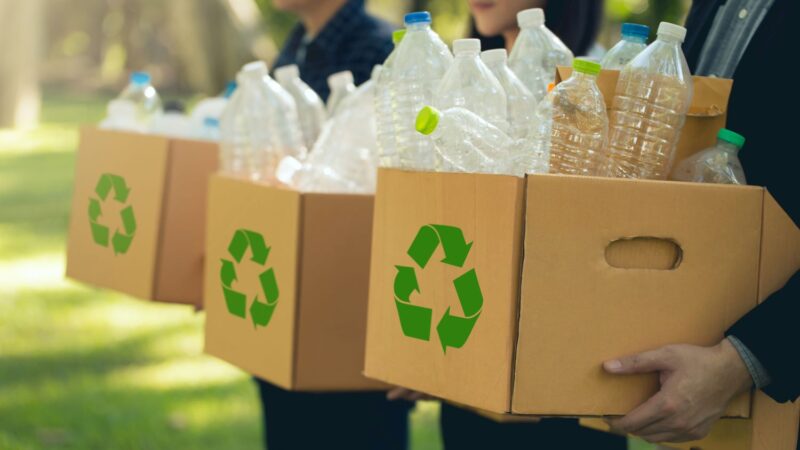As the Nation turns its attention to Clean Up Australia Day this weekend, its important to also to consider the impact cleaning up the waste at our organisations can have both on sustainability efforts but also on the bottom line. Waste Reduction can often be an easy place to start your sustainability efforts, as tangible results can often be quickly obtained, as recently experience by our Perth-based firm, Moore Australia (WA).
In early 2024, Moore Australia (WA) undertook a targeted initiative to reduce office waste and significantly increase recycling rates, recognising that good stewardship is both an environmental imperative and a sound business strategy.
The project saw the introduction of 5-way recycling bins (organic/composting, recycling, landfill, containers for change and cardboard) in the staff kitchen, alongside the removal of individual under-desk bins. This was complemented by the installation of 3-way bins (landfill, recycling, composting) across office floors, driving employee engagement in recycling and reducing reliance on landfill waste. These operational changes were aimed at reshaping behaviours, creating accountability and embedding sustainability into the fabric of our day-to-day processes.
The results have been impressive. Between February and September 2024, Moore Australia (WA) increased its recycling rate from 54.4% to 64.4%, demonstrating a marked improvement in resource efficiency. During the same period, the volume of non-recycled landfill waste dropped from 134.5 kg to 92.6 kg—an achievement that aligns with our broader ESG commitments. In addition, in a competitive office environment of 40 tenancies, Moore Australia (WA) advanced from ranking last in recycling in February, to 20th in April, and a commendable 4th by September. This upward trajectory signals both operational efficiency and enhanced environmental stewardship.
James Tng, Managing Partner at Moore Australia (WA), emphasised that the initiative was less about formal sustainability ratings and more about ingrained values: “We dislike wastage, and recycling is simply good governance. It reflects the way we want to manage resources—not just for ourselves but for future generations.” Tng also pointed out the financial benefits, highlighting how reducing waste directly influences the bottom line. Whether it’s making more conscious lunch decisions, cutting down on paper use, or even recycling bottles for charitable contributions, the initiative underscores the synergy between sustainability and operational efficiency.
This project exemplifies how thoughtful, strategic decisions can create tangible business benefits, aligning with a broader corporate vision of sustainable growth. As Tng noted, “We view this as an ongoing journey. Our focus is on continuously identifying ways to reduce wastage and leverage these efficiencies to improve financial outcomes. This is about long-term value creation, not just meeting short-term targets.”
At Moore Australia (WA), this initiative is more than a reflection of our environmental obligations—it is about creating a culture of responsibility, one that recognises the intrinsic link between sound governance, sustainability and business success.
How can recycling affect the bottom line of your business?
Recycling is linked to business success in several key ways:
- Cost Efficiency and Waste Reduction: By reducing the amount of waste sent to landfill and increasing recycling, businesses can lower their waste disposal costs. For example, recycling initiatives often reduce the need for costly landfill services and, in some cases, materials like paper, cardboard and certain plastics can be sold or reused, creating savings or additional revenue streams. Reduced consumption of materials (such as paper or packaging) leads to cost savings over time.
- Operational Efficiency: Recycling programs can improve resource efficiency by encouraging more mindful use of materials. This can reduce wasteful practices, resulting in fewer raw materials needed for operations. By optimising processes and reducing waste, businesses can streamline operations, making them leaner and more efficient.
- Corporate Reputation and Brand Value: Companies that implement sustainable practices, such as recycling, enhance their reputation among consumers, clients and partners. In an era where stakeholders increasingly value environmental responsibility, demonstrating leadership in recycling can differentiate a business and boost its brand value, helping attract both customers and top talent who want to align with ethical, responsible organisations.
- Regulatory Compliance and Risk Management: In many jurisdictions, businesses are facing increasing pressure to comply with environmental regulations. Proactively implementing recycling initiatives positions a company ahead of regulatory changes, reducing the risk of fines or penalties. It also demonstrates a proactive approach to sustainability, which is often viewed positively by regulators and investors.
- Employee Engagement and Corporate Culture: A commitment to sustainability, including recycling, can improve employee morale and engagement. When employees see their company taking real steps toward environmental responsibility, they are often more motivated and feel a greater sense of belonging and pride in their workplace. A positive corporate culture can, in turn, enhance productivity and retention.
- Long-Term Value Creation: Recycling is part of a broader sustainability strategy that helps future-proof businesses. As markets evolve and customers, investors and governments place more value on sustainable practices, businesses that have already integrated recycling into their operations are better positioned to thrive. This creates long-term value by fostering resilience and sustainability in both environmental and financial terms.
In essence, recycling contributes to operational savings, aligns with stakeholder expectations and enhances brand reputation, all of which contributes to sustainable business success.
If you are interested in exploring how you can take the next step on your sustainability journey and the positive impact it can have on your business, please reach out to your local Moore Australia contact for more information.


















